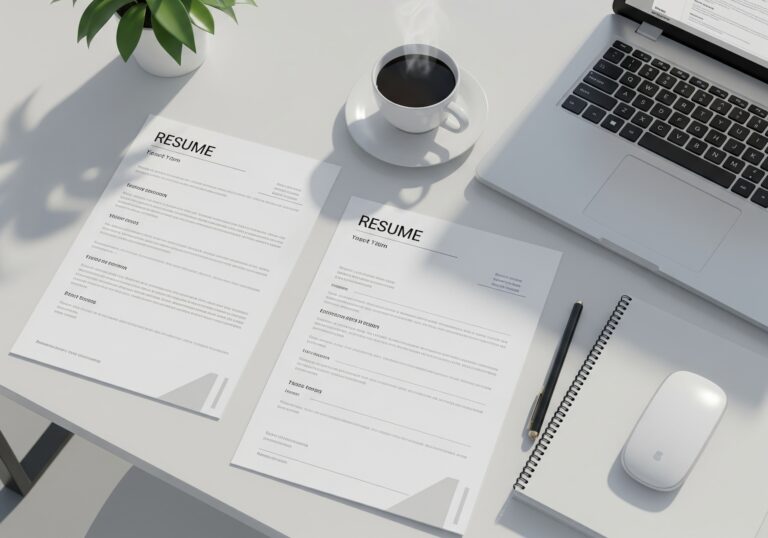What to Say in a Job Interview: 10 Scripted Answers That Work

Why Strong Answers Matter in Interviews (2025 Edition)
In today’s competitive market, it’s not just what’s on your resume that gets you hired — it’s how you present your value through words. Recruiters and hiring managers look for clarity, confidence, and connection during interviews.
Your ability to articulate who you are, what you’ve done, and how you solve problems is often the deal-maker. That’s why knowing what to say in a job interview — and saying it strategically — is one of your biggest assets in 2025.
How to Use Scripts Without Sounding Scripted
Yes, you can prepare scripted interview answers — as long as they sound natural. Think of scripts like rehearsed talking points, not robotic memorization. The goal is to speak with structure, not stiffness.
Practice using the STAR method (Situation, Task, Action, Result), but infuse your personality and real language. Interviewers want to hear you, not a template. Scripts are tools — not crutches.
Answer #1: “Tell Me About Yourself”
This question opens almost every interview. Avoid reciting your resume. Instead, use a professional story arc:
Scripted Example: “I started my career in [field], where I quickly discovered a passion for [specialization]. Over the past [X years], I’ve worked on projects that strengthened my [skills], and now I’m excited to bring that experience to a role where I can [value proposition tied to the job].”
Keep it concise (60–90 seconds), relevant to the role, and forward-focused.
Answer #2: “Why Should We Hire You?”
This is your chance to connect your strengths to their needs. Don’t guess — use the job description as your script outline. Focus on value, not vanity.
Scripted Example: “From your listing, I understand you’re looking for someone who can [key responsibility]. With my background in [relevant experience] and a track record of [key achievement], I’m confident I can deliver immediate value and grow with your team.”
This is where knowing the company’s pain points and aligning your skills can separate you from generic responses.
Answer #3: “What Are Your Strengths?”
The best way to frame your strengths is through proof and relevance. Pick 2–3 strengths aligned to the job and anchor them in real outcomes.
Scripted Example: “I’m especially strong in [Skill #1], which helped my team [result]. I also bring [Skill #2], which I used to [short success story]. These strengths support the core responsibilities of this role.”
Remember: strength without context = fluff. Use proof points.
Answer #4: “What Are Your Weaknesses?”
This classic trap question tests your self-awareness and coachability. Avoid cliché answers like “I work too hard.” Instead, share a real, minor weakness and show how you’re actively improving it.
Scripted Example: “Earlier in my career, I struggled with public speaking. I noticed it limited my impact in team meetings, so I enrolled in a speaking course and started leading small presentations. It’s still a growth area, but I’ve made measurable progress.”
Demonstrating growth shows maturity — not weakness.
Answer #5: “Where Do You See Yourself in 5 Years?”
This question gauges ambition and alignment. Employers want to know if your growth path fits their team and culture. Avoid extremes — don’t sound aimless or like you’re jumping ship fast.
Scripted Example: “In five years, I see myself taking on greater leadership in [industry/function], ideally within an organization like yours that values [company value or culture trait]. I’m focused on learning deeply, contributing meaningfully, and growing into a strategic role.”
Balance personal drive with commitment to the company’s vision.
Answer #6: “Why Are You Leaving Your Current Job?”
Stay diplomatic. This isn’t the time to vent — it’s about fit, growth, and timing. Keep it professional and forward-looking.
Scripted Example: “I’ve learned a lot in my current role, but I’m looking for new challenges where I can apply my skills more strategically and grow in a more collaborative environment. This opportunity feels like the right next step.”
Focus on what you’re moving toward, not what you’re escaping.
Answer #7: “Describe a Challenge and How You Handled It”
This is a classic behavioral interview question. Use the STAR method (Situation, Task, Action, Result) to tell a story with impact.
Scripted Example: “In my previous role, we faced a last-minute client pivot that risked project deadlines. I reorganized the team’s workflow, proposed a streamlined delivery plan, and maintained weekly touchpoints with the client. We delivered on time and received positive feedback on adaptability.”
Choose a challenge that showcases leadership, problem-solving, or initiative.
Answer #8: “Tell Me About a Time You Failed”
This isn’t about exposing your flaws — it’s about showing resilience and reflection. Choose a real but low-stakes failure, and focus on what you learned.
Scripted Example: “Early in my career, I underestimated how long a major deliverable would take. As a result, I missed the internal deadline. I owned the mistake, created a new timeline with stakeholder input, and delivered ahead of the revised schedule. I now build in buffers and communicate risks early.”
Failure without accountability hurts you. Show how it made you better.
Answer #9: “What Are Your Salary Expectations?”
This can be tricky, but you need to show market awareness and flexibility. Use a range, not a fixed number, and base it on research.
Scripted Example: “Based on my research and the scope of the role, I’d expect something in the range of [$X–$Y]. That said, I’m open to the full compensation package and the right fit is more important than just the number.”
Be confident, not cagey — and always research using tools like Glassdoor, Levels.fyi, or Payscale.
Answer #10: “Do You Have Any Questions for Us?”
This question is your final moment to show curiosity and alignment. Never say “no” — always have thoughtful questions ready.
Scripted Examples:
- “What does success look like in the first 90 days?”
- “How does this team measure performance?”
- “What are the company’s priorities for the next year?”
Smart questions show preparation, strategy, and that you’re evaluating them as much as they’re evaluating you.
How to Close the Interview With Confidence
Your closing statement can leave a lasting impression. Use it to reaffirm interest, thank the interviewer, and hint at next steps.
Scripted Example: “Thanks again for your time today. I’m genuinely excited about the role and how I can contribute. Please let me know if there’s anything else I can provide. I look forward to next steps.”
This leaves the conversation warm, proactive, and professionally assertive.
Interview Tips for Virtual and In-Person Settings
In 2025, interviews happen both online and in person — and each requires its own finesse.
- Virtual tips: Test tech early, keep background simple, maintain eye contact via camera.
- In-person tips: Arrive early, dress for the company culture, bring printed resumes.
Regardless of format, body language, clarity, and listening skills matter as much as the words you say.
Common Mistakes to Avoid During the Interview
Even great candidates can lose out due to small slip-ups. Avoid these:
- Rambling or going off-topic
- Over-rehearsing and sounding robotic
- Speaking negatively about past employers
- Failing to ask questions at the end
A polished script is great — but genuine confidence and connection are what win the offer.
Conclusion: Prepare Your Words, Then Own the Room
Knowing what to say in a job interview gives you power. When you prepare your answers with intention and speak with clarity, you position yourself as the obvious choice — not just a qualified applicant.
Use these 10 scripts as a starting point. Make them your own. Then step into every interview ready to connect, communicate, and get hired.
1. What should I say in a job interview to stand out?
Use specific, tailored responses that align your skills with the company’s needs. Speak clearly, confidently, and show how you’ll add value.
2. Is it okay to script interview answers?
Yes — as long as you rehearse enough to sound natural. Use scripts for structure, not memorization.
3. How do I answer ‘What are your weaknesses?’ effectively?
Pick a real weakness that isn’t core to the job and show how you’re actively working on it.
4. What if I blank during the interview?
Take a deep breath, ask for a moment to think, or say ‘That’s a great question — here’s how I’d approach it.’ Buy yourself time calmly.
5. How do I end a job interview professionally?
Thank them, express enthusiasm, and reaffirm your fit. A strong close includes gratitude and a forward-looking tone.
To learn more about leveling up your mindset and financial future, consider reading the following:






